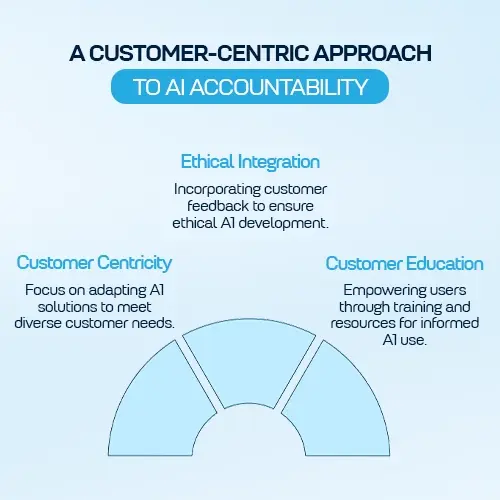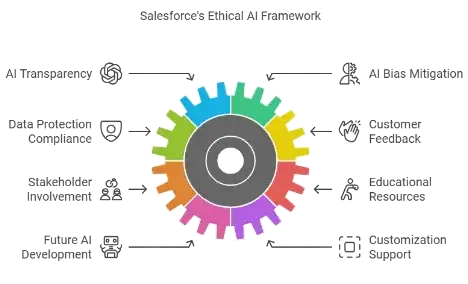
Artificial Intelligence (AI) technologies have become the backbone of innovation across industries, transforming the way businesses operate. However, with great power comes great responsibility. Concerns about the misuse and unintended consequences of AI, such as bias, privacy issues, and lack of transparency, are growing louder. Salesforce, a global leader in customer relationship management (CRM), has taken proactive steps to mitigate these risks. Through ethical frameworks, advanced tools, and continuous innovation, Salesforce ensures that its AI technologies serve humanity responsibly and effectively. Let’s discover more about this topic in this month’s post:
Salesforce acknowledges the dual-edged nature of AI technologies and has embedded ethical considerations into its development processes. By adopting an AI ethics framework, the company aims to reduce the potential harm caused by its tools. This framework encompasses principles like transparency, accountability, and fairness. Unlike traditional systems, AI’s complexity requires an approach that not only focuses on results but also the pathways through which these results are achieved.
One of the critical elements of this framework is ensuring AI transparency in
Salesforce tools. By offering clarity on how algorithms make decisions, the company empowers users to trust
its AI solutions. This transparency fosters a collaborative environment where customers can use AI
technologies without fearing hidden agendas or unethical practices.
Examples of this can be found in Salesforce’s Explainable AI feature. This tool breaks down how
predictive analytics work, explaining outcomes in simple terms to users. It’s a practical way to show
commitment to ethical AI development while empowering end-users with insights. For example, a retail business
can use Explainable AI to understand how product recommendations are generated, helping to build trust and
optimize decision-making processes.
Salesforce’s ethical framework extends to governance, where teams are dedicated
to reviewing and auditing AI systems regularly. This process includes identifying potential risks, mitigating
harm, and ensuring compliance with industry standards. The overarching goal is to create a culture of trust,
where AI serves humanity rather than harming it.
ProTip: Always include governance checkpoints when deploying AI models. Regular reviews not only ensure
compliance but also foster a culture of transparency and accountability.
AI bias can occur due to skewed data sets or flawed algorithmic designs, resulting in unfair outcomes. Salesforce AI solutions actively combat bias by utilizing diverse data inputs and rigorous testing protocols. The company’s Data Science teams employ real-world simulations to identify and address biases before deployment. Additionally, the Salesforce AI accountability model serves as a guiding principle for evaluating AI’s real-world impact.
Through this model, Salesforce ensures that AI applications align with ethical standards, fostering a system that prioritizes equity over profit. This proactive stance sets a benchmark for other organizations aiming to address bias in their AI-powered tools. For example, Salesforce integrates ethical audits into its product lifecycle, ensuring that algorithms are designed with fairness in mind from inception to execution.
Consider a case study where Salesforce partnered with an e-commerce firm to refine its AI-based product recommendation system. By addressing biases in training data, the company improved the accuracy and inclusivity of its recommendations, resulting in a 20% increase in customer satisfaction.
Furthermore, Salesforce invests in research partnerships to explore novel methods of reducing AI bias. These collaborations not only enhance its internal systems but also contribute to the broader industry’s understanding of equitable AI practices. By remaining transparent about its methodologies, Salesforce fosters a dialogue that encourages collective improvement across sectors.
Tips for Reducing Bias:
Example:A healthcare provider using Salesforce AI tools identified that its predictive algorithms favored urban patients over rural ones due to an imbalance in training data. By incorporating additional rural health data, they reduced bias and achieved more equitable outcomes.

In a digital-first world, protecting sensitive data is paramount. Salesforce’s AI technologies are designed with robust security measures to safeguard customer data. Privacy features, like anonymized data processing and user-controlled settings, are integrated into AI-powered Salesforce tools. These tools comply with global data protection regulations, ensuring that ethical considerations extend to privacy.
Salesforce’s privacy-first approach involves continuous monitoring and updating of security protocols. By staying ahead of emerging threats, the company minimizes risks associated with AI technologies. Moreover, Salesforce emphasizes user empowerment by providing customers with clear control over their data. This dual approach of security and empowerment establishes a foundation of trust, ensuring that AI tools are both effective and ethical.
An example of this is the company’s AI Shield initiative, which focuses on protecting data integrity while promoting transparency. This initiative reflects Salesforce’s commitment to aligning AI development with societal values, ensuring that privacy concerns are addressed without compromising innovation.
Tips for Enhancing Privacy:
Case in Point: A financial institution leveraging Salesforce AI Shield found significant improvements in data security after implementing advanced encryption techniques. This led to a 35% reduction in data breach incidents over the course of a year.
Moreover, Salesforce’s preventing AI harm initiatives involve educating developers and customers on
ethical AI practices. By offering training resources and guidelines, the company ensures that users can
harness the power of AI responsibly.
One notable partnership is with leading universities to develop open-source tools that analyze AI
fairness. These tools are made available to the public, encouraging widespread adoption of ethical practices.
Such initiatives demonstrate Salesforce’s dedication to collective progress, showcasing how collaboration can
drive meaningful change in the AI landscape.
Examples of Collaborative Initiatives:
Practical Insight: Collaboration ensures diverse perspectives in AI development, which minimizes blind
spots and enhances inclusivity. Businesses can emulate this approach by forming cross-functional teams to
evaluate AI tools.
A defining feature of Salesforce’s AI solutions is its focus on customer-centricity. The company’s tools are designed to be adaptable, enabling businesses to customize them according to their unique needs. This flexibility ensures that Salesforce AI solutions meet the diverse requirements of its global customer base while adhering to ethical standards.
The company’s AI ethics framework integrates customer feedback into the development cycle, ensuring that the end products resonate with real-world demands. By maintaining this customer-first approach, Salesforce not only addresses potential harm but also reinforces its reputation as a trusted AI leader.
In addition, Salesforce’s commitment to customer education empowers users to make informed decisions about AI adoption. Through webinars, whitepapers, and hands-on training sessions, Salesforce ensures that customers understand both the opportunities and risks associated with AI technologies.
AI tools are only as effective as the people using them. Ensure your marketing team understands how to interpret AI insights, use AI-driven optimization tools, and balance automation with creativity.
Tips for Businesses Using AI:
Example: A mid-sized retailer implemented Salesforce AI solutions to improve its supply chain logistics. By attending Salesforce’s training sessions, the retailer’s team learned to fine-tune the AI system, leading to a 25% reduction in operational costs.

Salesforce continuously innovates to address emerging challenges in AI governance.
The company’s recent advancements include automated auditing tools that monitor AI systems in real-time,
identifying and rectifying potential risks. These tools utilize advanced algorithms to detect anomalies,
ensuring that AI applications function within ethical boundaries.
Another key innovation is Salesforce’s Ethical AI Dashboard, which provides users with insights into
their AI systems’ performance and compliance with ethical standards. This dashboard exemplifies the company’s
commitment to transparency and accountability, offering users the tools they need to manage AI responsibly.
By integrating these innovations into its offerings, Salesforce demonstrates its proactive approach
to mitigating harm while driving technological progress. These advancements not only enhance customer trust
but also set new benchmarks for ethical AI development.
Examples of Governance Tools:
Example: A global logistics company improved compliance by 40% after implementing Salesforce’s Ethical AI Dashboard. This tool provided actionable insights into areas requiring ethical adjustments.
As AI technology evolves, Salesforce remains committed to addressing its
potential risks. The company’s focus on innovation, transparency, and ethical practices positions it as a
pioneer in the AI landscape. With initiatives aimed at reducing AI bias and fostering accountability,
Salesforce ensures that its tools serve as enablers of positive change.
Salesforce’s roadmap includes expanding its AI ethics framework to incorporate emerging technologies.
By staying ahead of the curve, the company continues to set industry standards for responsible AI
development. Its vision emphasizes creating an ecosystem where technology and humanity coexist harmoniously.
Looking forward, Salesforce plans to invest in new partnerships and research initiatives that
explore the intersection of AI and ethics. These efforts will further solidify its leadership in creating
responsible AI technology that benefits businesses and society alike.
Future Goals:
At SMB Business Solutions, we understand the critical role of ethical AI in
transforming businesses. As we partner with clients to implement Salesforce’s advanced AI solutions, our focus
remains on ensuring transparency, reducing risks, and achieving measurable outcomes.
To explore how we can tailor Salesforce’s AI technology to your business needs, contact us today.
Q1: What is Salesforce’s primary approach to AI transparency?
A: Salesforce
ensures clarity on how algorithms work, fostering trust among users.
Q2: How does Salesforce tackle AI bias?
A: By using diverse data sets and rigorous testing protocols.
Q3: Does Salesforce’s AI comply with data protection laws?
A: Yes, its tools align with global regulations
to ensure privacy and security.
Q4: What role does customer feedback play in Salesforce’s AI solutions?
A: Feedback is integral to
customizing tools and maintaining ethical standards.
Q5: How does Salesforce involve stakeholders in ethical AI development?
A: Through partnerships with
universities, NGOs, and policy-makers.
Q6: What resources does Salesforce offer to educate customers about AI?
A: Webinars, whitepapers, training
sessions, and open-access tools.
Q7: What’s next for Salesforce in ethical AI development?
A: Expanding its framework to incorporate emerging
technologies and global standards.
Q8: Can businesses customize Salesforce’s AI tools?
A: Yes, Salesforce AI tools are designed to be adaptable
to diverse business needs.
Q9:How does Salesforce support businesses in reducing AI risks?
A: By offering tools like Ethical AI
Dashboards and comprehensive training sessions.

Copyrights © 2025 SMB Business Solution | All Rights Reserved
Designed & Developed by Digital Hyperlinks (PVT) LTD.